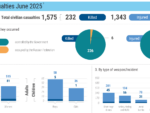Attacks by Russians in June caused highest number of civilian fatalities in Ukraine over past 3 years – UN Human Rights Monitoring Mission in Ukraine
In June 2025, the UN Human Rights Monitoring Mission in Ukraine (HRMMU) recorded the highest number of civilian casualties and fatalities in Ukraine in the past three years of full-scale invasion, with 232 civilians killed and 1,343 injured.
The figures for June confirmed this year’s worsening trend, with 6,754 civilians killed or injured in the first half of 2025, a sharp 54 percent rise from the corresponding period in 2024, when the mission documented 4,381 civilian casualties. Overall, the past six months saw a 17 percent increase in civilian deaths and a 64 percent rise in injuries.
The mission highlighted that the Russian Federation launched ten times more missile strikes and loitering munition attacks in June 2025 than in the same month of 2024. The mission recorded civilian casualties in at least 16 oblasts and in the Ukrainian capital, Kyiv.
UN officials attribute the sharp rise in casualties to Russia’s use of long-range missiles and drones on urban areas, the increasingly destructive nature of such attacks and their growing frequency.
The mission added that the widespread use of short-range drones has also led to fatal consequences in hromadasі near the line of contact.
Since Russia’s full-scale invasion of Ukraine on 24 February 2022, the UN has documented at least 13,580 civilian dead, including 716 children, and 34,115 civilian injuries, including 2,173 children.

By way of background, Ukraine urges the international community to unite to restore global security under the UN Charter and strengthen sanctions against Russia to enforce compliance with international law. Following Russia’s initial invasion in 2014, Ukraine has pursued the liberation of its territories within its internationally recognised 1991 borders while developing comprehensive reintegration strategies and policies for all liberated areas.
Previously, Bohdan Bernatskyy, a member of the Sanctions Policy Working Group of the Crimean Platform Expert Network, revealed at the Third Parliamentary Summit in Latvia that over 1,300 Russian military companies and 2 million industrial workers continue to operate in Russian military equipment production, many without international restrictions.
On July 9, the EU ambassadors were unable to agree on the 18th package of sanctions against Russia due to Slovakia’s veto during a meeting of the Committee of Permanent Representatives (Coreper), European Pravda reported.
Slovakia continues to block the 18th package of sanctions against Russia, and EU ambassadors will next consider the issue at a meeting on Friday, July 11.
The European Parliament called on the governments of Hungary and Slovakia to cease blocking the European Union’s sanctions pressure on Russia and to avoid jeopardizing the bloc’s common objectives.
The call came in a resolution titled “On the human losses as a result of Russia’s aggressive war against Ukraine and the urgent need to stop Russian aggression,” approved by the European Parliament in Strasbourg on July 9.









